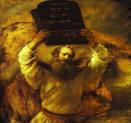
3.THE GENESIS OF THE NEW FAITH
4. ALLAH AND ISLAM IN ANCIENT HISTORY
|
Preface |
|
When, in consultation with President Wise and Dr. Kohut, I chose this subject for the Lectures on the Stroock Foundation, I did so partly because of my belief, long held, that some important matters relating to Mohammed and the quran Koran are in need of a fresh examination; partly also in the conviction that the Arabian prophet and his marvellous book are in themselves of such great interest that even a somewhat technical discussion may be given a hearing by the layman. The subject has a certain timeliness by reason of the many recent investigations in its field, and also because of the presence of new material relating to conditions in ancient Arabia. Among the conclusions which are given especial prominence in the Lectures, the following may be mentioned. The Jewish colonies in the Hijaz were established by a very considerable migration, chiefly from Palestine, in the sixth century B.C. Both Dozy and August Müller saw the plain evidence of a large migration of Jews from Palestine into northern Arabia, but neither was able to find a convincing reason for such a movement. A most suitable occasion is now seen to have been given by a remarkable episode in neo-Babylonian history. The orthodox Muslim dogma that Mohammed was an unschooled man is utterly untenable, though even the most recent treatises continue to give it some credence. The Arabian prophet is less mysterious than he has generally been regarded (every great genius, to be sure, is more or less of a mystery). He was at all times sincere, never doubting that the self-hypnotism which he had learned to produce, and which he continued to practise at critical times, brought him a divine revelation. His naiveté is commonly exaggerated by modern interpreters and made to explain too much; very often what seems merely childlike is the result of long reflection and wise calculation. The doctrine that the foundation of Islam was mainly Christian has held the field for nearly half a century. It is completely refuted, however (as I think will appear), partly by evidence which the quran Koran furnishes, partly also by material gathered from pre-muhammad Mohammedan Arabia. The "higher criticism" of the quran Koran has suffered from undue dependence on the native commentators. Certain theories too hastily propounded by the greatest European authorities in this field have dominated all subsequent research. "islam Islåm" began with Ishmael, the father of the Arabs. It was thus by right primarily an Arabian religion, even though Ishmael's sons had rejected it. Mohammed's account of the Sacrifice (Sura 37: 100 ff.) is very skilfully managed. The Lectures were delivered in March, 1931, but for various reasons it was not found practicable to publish them at once. Lectures I, IV, and V are given here very nearly in the form in which they were delivered. Lectures II and III, as they are here published, show a very considerable expansion and rearrangement, each containing an amount of material which is too technical to be inflicted on a popular audience. It is a source of regret that some books from which I could have received instruction have not been accessible to me. I am especially sorry that Professor Rostovtzeff's Caravan Cities came to hand too late for my use. The verses of the quran Koran are cited (as is now customary) according to the numbering in Flügel's edition. Semitic names and words generally familiar are not transliterated exactly, but are given in their popular form. Citations not strictly verbal are indicated by single quotation marks. It remains to tender hearty thanks to the Bloch Publishing Company for the care which they have bestowed on the typography of the volume and on all the details of its publication. CHARLES C. TORREY May, 1933 |